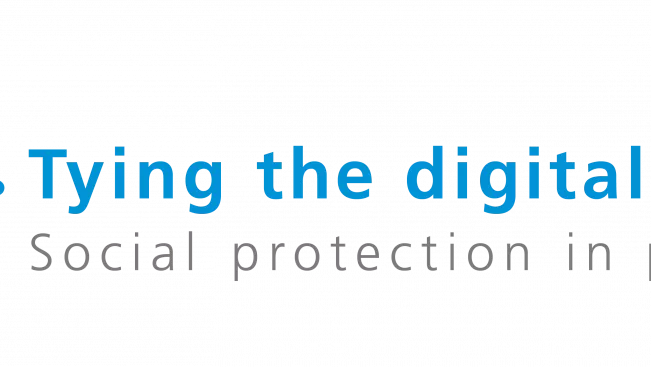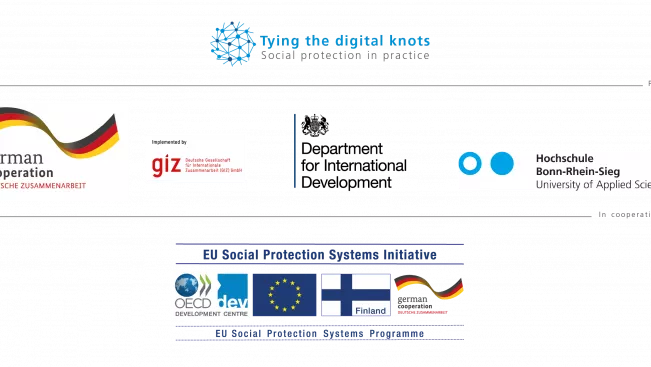Department of Social Policy and Social Security Studies
Tying the digital knots 2018

Tying the digital knots
Friday, 14.09.2018, 8:30am – 4.30pm
University Club Bonn, Germany
Abstract
Social protection programs are often planned and implemented in isolation, failing to unlock the potential inherent to a harmonized social protection system. Digitalization can help tie the knots. Integrated data management can greatly move beyond the current fragmentation enabling a systems approach to universal social protection. Digitalized data on citizens leads to better analytics; digitalized information to better service delivery; digitalized administrative processes to more efficiency and transparency. But what is required to tie the knots? Which technical, political and financial challenges need to be overcome? How is data privacy guaranteed and data effectively coordinated across agencies? What are some innovations which might revolutionize or at least change the sector?
The conference assembles development practitioners, digital experts, policymakers, donors and researchers as well as leading voices in the field of social protection, data security and information systems technology. It provides a platform for the discussion of concepts, ideas, implementation strategies and country experience in establishing integrated systems as well as the potential for future alliances in the field of digital social protection.
Agenda
09:00-09:30: Welcome
Intro Days facilitator: Sebastian Kuhn, GIZ
What is social protection? What does the new frontier digital social protection embrace? What are the key channels through which digitalization facilitates the delivery of social protection? In the context of the current drive for universal social protection, speakers will address the question of how digital solutions in integrated data management increase the impact of social protection programmes.
Welcome address
- Prof. Dr. Iris Groß, Vice President for teaching, learning and further education, HBRS
- Andreas Proksch, GIZ
- Alaistair Ager, DFID
09:30-10:45: Session 1
Integrated Data Management– what is it and what does it look like?
How can digital technology enable integrated social protection data models ranging from social registries,management information systems (MIS) to civil/ tax registries to be linked into coherent information systems as part of a broader e-government eco-system? The session aims to familiarize the audience with the key concepts of integrated information management contributing to a more impactful implementation of social protection. Drawing on key lessons from countries that have invested in integrated information systems, the session explores how digital solutions can improve end to end social protection services and empower its beneficiaries.
Session facilitator: Emily Henderson, DFID
- Integrated information management: Short movie
- Beyond registries: A concept for integrated information management: Richard Chirchir, Development Pathways
- Integrated information management: The case of Malawi: Suzgo Luhanga, Ministry of Finance, Economic Planning and Development Malaw
11:15-12:45: Session 2
Technology Frontiers: Newest applications and their use for integrated data management
What are the key innovations in digital social protection – tried and tested in the field or still at a conceptual level? What potential lies in blockchain, machine learning or big data? With a series of short and crunchy technological spotlights, the session sheds some light on their purpose and application in integrated information systems.
Session facilitator: Hans-Peter Baur, Federal Ministry for Economic Cooperation and Development (BMZ)
The potential of technology and integrated information managemt
- Using GIS in integrated information management-the case of MNREGA (India), Rajeev Ahal, GIZ India
- With open source towards intergrated information management-the example of openIMIS, Dr. Madan Kumar Upadhyaya, Health Insurance Board, Nepal, Suarav Bhatterai, GIZ, Nepal
- The potential of blockchain in social protection, Kate Dodgson, HumaityX, TU Delft HumTech Lab
- Linking machine learning and forecast-based financing: the Togo Red Cross experience, Pablo Suarez, Red Cross Red Crescent Climate Centre
Implementing digital social protection – Current challenges at national and international level
As establishing integrated information management and related digital tools is as much a political as it is a technical process, the session will draw on implementation experience and current developments in selected countries. What are and how to create a conducive institutional and political setting for digital social protection? How can we ensure that international agencies facilitate and not thwart integrated information management? What privacy and data protection requirements have to be considered and how to translate them into practice? What are necessary digital competencies on the side of citizens and the administration that need to be built up?
Session facilitator: Prof. Dr. Esther Schuring
Part a: National Level
- Opportunies and challenges when implementing integrated information management systems, Valentina Barca, Oxford Policy Management
- Establishing intergrated information management-Lessons learnt from several countries, Philippe Leite, World Bank
- Digital ID-Citizenship, data privacy and biometrics, Paul Makin, Digital Finance and Identity Consultant at Trouver Ltd.
- Country reflections, Suzgo Luhanga, Ministry of Finance, Economic Planning and Development Malawi & Syed Mohsin Rizvi, National Database & Registration Authority (NADRA)
Short Break
Part b: International Level
- Coordination at international level: Lessons learnt from digital health, Carl Leitner, Digital Square
- Discussion session: Towards a roadmap: How can we maximise opportunities and address challenges for greater use of digital solution in social protection? Panel-Anush Bezhanyan, World Bank, Alastair Ager, DFID, Dr. Axel Klaphake, GIZ
Conclusion and Wrap-up
- Session facilitator: Sebastian Kuhn, GIZ
- Closing remarks: Stefanie Ruff, BMZ
If you wish to attend this conference, please sign up here. Registration ends on the 5th of September 2018.

Dokumente